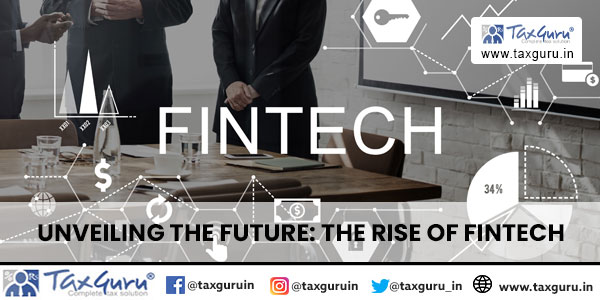The financial services sector has experienced a significant metamorphosis in recent times, driven by the swift progress of technology. Fintech, a revolution in financial services that has upended traditional banking and financial systems, promises to improve accessibility, efficiency, and inclusivity of financial services through creative solutions. Fintech has transformed how we handle our money, transact, and invest for the future. Examples of these innovations include robo-advisors and mobile payments.
Fintech, at its core, is a broad category of technologies and applications that use blockchain, artificial intelligence, data analytics, digital platforms, and other state-of-the-art tools to provide financial services and products. Payments is one of the industries where fintech is most evident. The way we send and receive money, pay bills, and divide expenses with friends and family has been completely transformed by mobile payment apps like Square Cash, PayPal, and Venmo. With the ease, speed, and security these platforms provide, traditional cash and check transactions are becoming less and less relevant.

Fintech has also made financial services more accessible, especially to underserved and unbanked communities. Without the need for physical branches or minimum balance requirements, consumers can access no-fee checking accounts, savings accounts, and budgeting tools through digital banking platforms like Chime and Revolut. This has made it possible for people who were previously shut out of the traditional banking system to engage with the mainstream of finance.
Fintech is also having a big impact on the lending and credit industries. Peer-to-peer lending platforms, like Prosper and LendingClub, eliminate traditional banks and financial intermediaries by connecting borrowers and individual investors directly. Due to the disintermediation, lending procedures have become more efficient, expenses have decreased, and credit availability has increased for new and small enterprises as well as for those with imperfect credit histories.
Fintech has also completely changed the investing industry by lowering the cost and increasing the accessibility of wealth management and investment advisory services. Robo-advisors, like Wealthfront and Betterment, manage portfolios and offer individualized investment advice at a fraction of the cost of traditional financial advisors by using automated and machine learning algorithms. Retail investors now have the ability to create diversified investment portfolios that are suited to their unique risk tolerances and financial objectives.
Another disruptive force in fintech is blockchain technology, which powers cryptocurrencies like Ethereum and Bitcoin. Blockchain provides an immutable, decentralized ledger system that improves financial transaction efficiency, security, and transparency. Although there has been regulatory scrutiny and volatility surrounding cryptocurrencies, the underlying blockchain technology has potential uses beyond digital currencies, such as supply chain management, identity verification, and smart contracts.
Fintech offers many advantages and opportunities, but there are hazards and difficulties as well that need to be considered. The fintech industry faces several key issues, including cybersecurity threats, data privacy concerns, regulatory compliance, and ethical considerations. Stakeholders must cooperate as fintech develops and becomes more widespread in order to guarantee that innovation is balanced with responsible risk management and governance.
To sum up, fintech is a revolutionary force that is drastically changing the financial services industry. Fintech provides cutting-edge solutions that aim to improve financial inclusion, efficiency, and accessibility for people and businesses worldwide, spanning from payments and banking to lending and investing. One thing is certain: digital finance is the way of the future as we negotiate the opportunities and challenges presented by the fintech revolution.




